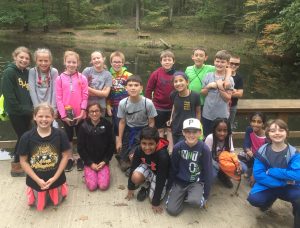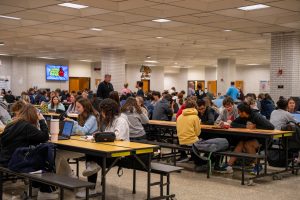Over-schooled, Under-prepared
Could the American educational system do more to equip students for the real world?
September 9, 2018
Many people in the United States have never heard of the tiny Baltic nation of Estonia. Its population is less than that of Allegheny County’s. Furthermore, the economy is about a third the size of that of Pittsburgh.
However, students in this tiny, relatively newly independent country perform 20% better on tests than students in the United States. It’s not even that Estonian students go to school for longer. From 1st to 8th-grade, Estonian students go to school for 3000 hours less than students in the United States.
But as a lot of us know, test scores are not everything. Preparing for the real world and job training can often be a much bigger key to a person’s success. The issue is that the American educational system is not doing enough to prepare for job experiences.
Data from 2010 shows that just 62% of college graduates had a job that required a degree. Furthermore, only 27% have a job that is related to their degree. College graduates are clearly not prepared for the world waiting for them. So what are colleges not doing to prepare their students?
Most of an American student’s education is centered around essays and test taking. While this is a relatively inexpensive and easy way to gauge a student’s knowledge on a subject, few bosses are going to ask their employees to memorize chapter 6 by Friday. A heart surgeon won’t be successful if their only training was taking a test on where the heart is and what tools to use. Similarly, many of us are taking drivers’ tests soon or have taken one within the past year or two. There’s a reason the written permit test isn’t the actual driver’s test. People need to do something to be good at it.
A solution to this is an emphasis on apprenticeships and co-ops. Some colleges are now offering five-year programs that have temporary real-world experiences built in. Such a trend would have a positive effect on a student’s chances of getting a job in their field. In addition, students would be able to “test” out jobs to see if that’s where they wanted to spend the rest of their careers.
In an educational sense, co-ops can improve a student’s GPA and test scores. In a study conducted by the American Society for Engineering Education (ASEE), students who took a co-op had a 6% increase in their college GPA.
Moreover, co-ops often pay more than the entry-level jobs where students typically work. College students, in particular, can earn up to $90,000 a during a semester co-op. This can also help to alleviate some of the stress of student loans.
The American education system has fallen behind. Students are overworked and underprepared for the real world. This hurts the economy and leaves college students in massive debt. High school graduates who go straight into the workforce have even less experience and suffer even more. It’s time to start thinking of and implementing solutions. By offering students more co-op opportunities, schools can better prepare their pupils for the real world, give them a safe financial base to start their careers with, and help them weed out any jobs that aren’t right for them.














TheCreature • Sep 13, 2018 at 5:22 pm
Welcome to the NASH Uproar, Michael! Love this article. This is a great step in a challenging direction for you, but nonetheless rewarding; uncovering our flaws and promoting higher initiatives and better ideas is not an easy task. Don’t be afraid to tackle some of these issues that are propagated right within the walls of NASH. But you won’t find any in the Newsroom…its pretty much perfect. Except for the carpet, I hope y’all got that fixed. Keep up the fantastic work!
Jonathan Ross • Sep 9, 2018 at 3:15 pm
I agree the american school system is messed up, but, to be fair, the Estonian education reforms aren’t applicable to the US economy.